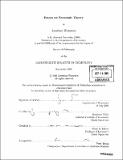Essays on economic theory
Author(s)
Weinstein, Jonathan
DownloadFull printable version (5.095Mb)
Other Contributors
Massachusetts Institute of Technology. Dept. of Economics.
Advisor
Muhamet Yildiz and Glenn D. Ellison.
Terms of use
Metadata
Show full item recordAbstract
These four essays concern the theory of games and its application to economic theory. The first two, closely linked, chapters are an investigation into the foundational question of the sensitivity of the predictions of game theory to higher-order beliefs. Impact of Higher-Order Uncertainty with Muhamet Yildiz In some games, the impact of higher-order uncertainty is very large, implying that present economic theories may be misleading as these theories assume common knowledge of the type structure after specifying the first or the second orders of beliefs. Focusing on normal-form games in which the players' strategy spaces are compact metric spaces, we show that our key condition, called "global stability under uncertainty," implies a variety of results to the effect that the impact of higher-order uncertainty is small. Our central result states that, under global stability, the maximum change in equilibrium strategies due to changes in players' beliefs at orders higher than k is exponentially decreasing in k. Therefore, given any need for precision, we can approximate equilibrium strategies by specifying only finitely many orders of beliefs. Finite-Order Implications of Any Equilibrium with Muhamet Yildiz Present economic theories make a common-knowledge assumption that implies that the first or second-order beliefs determine all higher-order beliefs. (cont.) We analyze the role of such a closing assumption at any finite order by instead allowing higher orders to vary arbitrarily. Assuming that the space of underlying uncertainty is sufficiently rich, we show that, under an arbitrary fixed equilibrium, the resulting set of possible outcomes must include all outcomes that survive iterated elimination of strategies that are never a strict best reply. For many games, this implies that, unless the game is dominance-solvable, every equilibrium will be highly sensitive to higher-order beliefs, and thus economic theories based on such equilibria may be misleading. Moreover, every equilibrium is discontinuous at each type for which two or more actions survive our elimination process. Conversely, the resulting set of possible outcomes must be contained in rationalizable strategy profiles. This yields a precise characterization in generic instances. Price Dispersion and Loss Leaders Dispersion in retail prices of identical goods is inconsistent with the standard model of price competition among identical firms, which predicts that all prices will be driven down to cost. One common explanation for such dispersion is the use of a loss-leader strategy, in which a firm prices one good below cost in order to attract a higher customer volume for profitable goods. (cont.) By assuming high transportation costs which indeed force each consumer to buy all desired goods at a single firm, we create the possibility of an effective loss-leader strategy. We find, however, that such a strategy cannot be effective in equilibrium, so that additional assumptions limiting price search or rationality must be introduced to explain price dispersion or loss leaders. Two Notes on the Blotto Game We exhibit a new equilibrium of the classic Blotto game in which players allocate one unit of resources among three coordinates and try to defeat their opponent in two out of three. It is well known that a mixed strategy will be an equilibrium strategy if the marginal distribution on each coordinate is U [0, 2]. All known examples of such distributions have two-dimensional support. Here we exhibit a distribution which has one-dimensional support and is simpler to describe than previous examples. The construction generalizes to give one-dimensional distributions with the same property in higher-dimensional simplexes as well. As our second note, we give some results on the equilibrium payoffs when the game is modified so that one player has greater available resources. Our results suggest a criterion for equilibrium selection in the original symmetric game, in terms of robustness with respect to a small asymmetry in resources.
Description
Thesis (Ph. D.)--Massachusetts Institute of Technology, Dept. of Economics, 2005. Includes bibliographical references.
Date issued
2005Department
Massachusetts Institute of Technology. Department of EconomicsPublisher
Massachusetts Institute of Technology
Keywords
Economics.